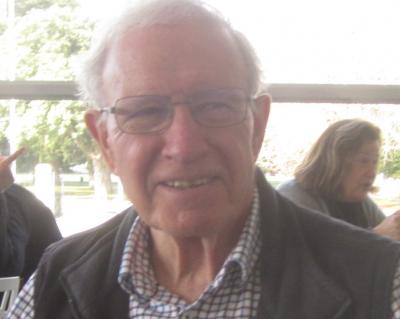Family Cluster Lockdowns were Bleaker and Longer
In 1956 schoolboy Brian Bourke found himself in an Ashburton hospital ward, a victim of New Zealand’s annual and brutal polio wave.
He was one of 897 victims in New Zealand that year of the polio virus.
It cost him his left leg, writes National Press Club president Peter Isaac.
Nationwide that same year 50 other victims were not so lucky. They lost their lives.
Mr Bourke a chartered accountant recalls now that his nurses were completely shrouded in sterile material and he was not to identify any one of his carers until many years later when one of them Monica McCormack recognised him at a church service and introduced herself.
When after 192 days in hospital he eventually returned to school Mr Bourke recalls that fellow pupils were wary of him, fearful that they might catch the polio virus from him.
In the event Mr Bourke (pictured) went on to establish himself in New Zealand’s North Island with an accountancy practice and a number of directorships.
Challenging the disadvantages presented by his withered leg he embarked upon distance swimming and represented New Zealand at a Masters’ tournament in Brazil.
More than 800 New Zealanders died from polio also known as infantile paralysis between 1916 and 1961 when the annual epidemic waves finally succumbed to the vaccine developed by Dr Jonas Salk.
The most deaths in one year in New Zealand was in 1925, when 173 people died.
The virus was associated with respiratory ailments and those most severely afflicted often required artificial breathing support.
Conversely and curiously in the light of the current Covid-19 plague taking its biggest toll on the unfit and the elderly the polio virus in contrast attacked the young and the vigorous such as Mr Bourke.
Equally conversely, the polio virus thrived in summer rather than in winter said to be the favoured transmission season for Covid 19.
The introduction of the Salk vaccine intercepted the polo virus prior to the era of mass travel which has proved such a contagion thoroughfare for Covid 19.
Pivoting agilely on the stick which compensates for his prosthetic left leg Mr Bourke who is now 78 knows that he is among the last who can testify through experience to the annual summer polio waves which left in their wake the paralysis of which he is a living victim.
The annual summer intervention of the polio virus which put him in the isolation ward of Ashburton hospital is fading over the institutional memory horizon he notes. Social distancing in the polio era for example centred on shuttering schools, swimming pools, theatres and amusement arcades.
Mr Bourke with his wife Margaret went on to have seven children and he remains a signal figure in community activity.
A lean, tallish fellow with the engaging smile of those sensing their own gift of life redeemed, Mr Bourke a carpentry buff by day and who at night dabbles in poetry believes that the fear and trembling evoked by Covid-19 should be put into human perspective………
“In 1956 we all feared polio because it had a preference for children. There is nothing like it around now. The symptoms were like a very bad dose of the flu with a severe fever. The effects were very different. The paralyses were swift. We were utterly defenceless against it. Doctors had no answer. ….
“When I arrived at hospital they were not sure if I had polio and they put me in a small room with green walls and no window to the outside. They gave me a lumber puncture in the late afternoon and then left me alone. That’s when the paralyses started. I could feel it coming on. I had a strange feeling in my left arm and my left leg. The nurses did not come to check on me. I got out of bed and walked up and down that small room until I could not walk anymore and I collapsed on the floor…
“The others in my family were not allowed to go to work or attend school. Nobody came to visit them and they only went out to buy food. They sat around in the dreary nor-west heat of early 1956 and wondered if they could drink from the same cup or if they should wash all the dishes again……”
In the meantime and declining to succumb to the ravages of age any more than he did to those of polio Mr Bourke nowadays in a self-imposed act of defiance hosts an annual swimming gala in which he personally swims an extra pool length for each additional passing year of his life.

